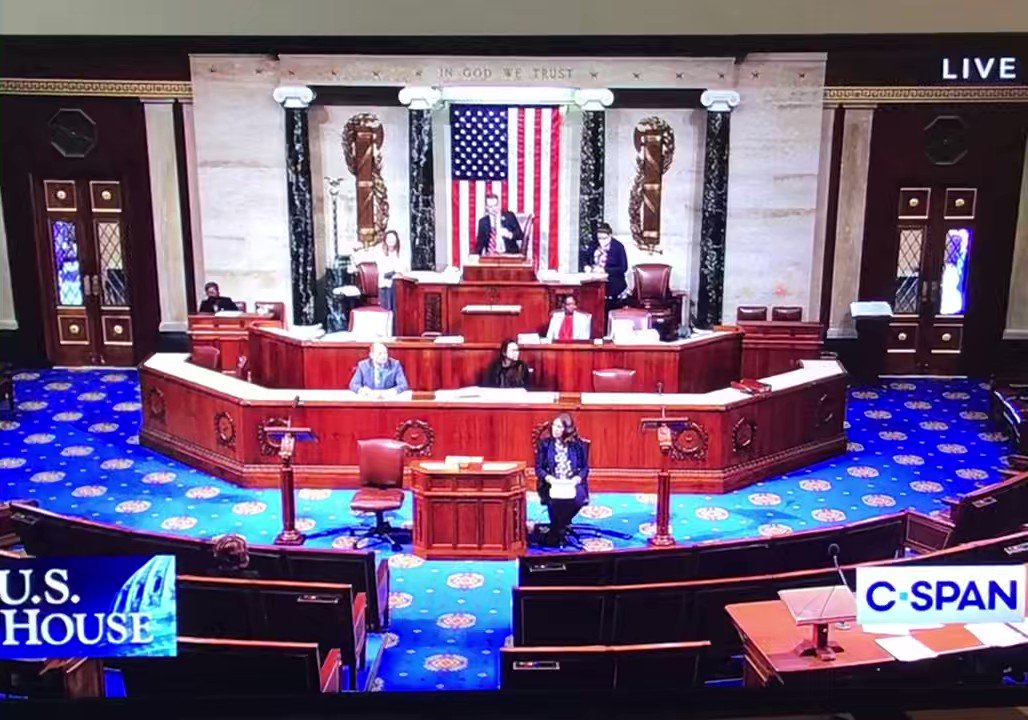
Today, by a vote of 225 to 201, the House passed the 4,155-page omnibus spending bill necessary to fund the government through September 30, 2023. The Senate passed it yesterday by a bipartisan vote of 68–29, and President Joe Biden has said he will sign it as soon as it gets to his desk.
The measure establishes nondefense discretionary spending at about $773 billion, an increase of about $68 billion, or 6%. It increases defense spending to $858 billion, an increase of about 10%. Defense funding is about $45 billion more than Biden had requested, reflecting the depletion of military stores in Ukraine, where the largest European war since World War II is raging, and the recognition of a military buildup with growing tensions between the U.S. and China.
Senators Patrick J. Leahy (D-VT) and Richard C. Shelby (R-AL) and Representative Rosa L. DeLauro (D-CT) hammered out the bill over months of negotiations. Leahy and Shelby are the two most senior members of the Senate Appropriations Committee, and both are retiring at the end of this session. Shelby told the Senate: “We know it’s not perfect, but it’s got a lot of good stuff in it.”
House Republicans refused to participate in the negotiations, tipping their hand to just how disorganized they are right now. House minority leader Kevin McCarthy (R-CA) insisted that the measure should wait until the Republicans take control of the House in 11 days. This reflects the determination of far-right extremists in the party to hold government funding hostage in order to get concessions from the Democrats.
But their positions are so extreme that most Republicans wanted to get the deal done before they could gum it up. Indeed, right now they are refusing to back Republican minority leader McCarthy for speaker, forcing him to more and more extreme positions to woo them. Earlier this week, McCarthy publicly claimed that if he becomes House speaker, he will reject any bill proposed by a senator who voted yes on the omnibus bill. After the measure passed the House, McCarthy spoke forcefully against it, prompting Representative Jim McGovern (D-MA) to say: “After listening to that, it’s clear he doesn’t have the votes yet.”
The measure invests in education, childcare, and healthcare, giving boosts to the National Institute of Health and the Centers for Disease Control and Prevention and investing in mental health programs. It addresses the opioid crisis and invests in food security programs and in housing and heating assistance programs. It invests in the Environmental Protection Agency and the National Park Service and makes a historic investment in the National Science Foundation. It raises the pay for members of the armed forces, and it invests in state and local law enforcement. It will also provide supplemental funding of about $45 billion for Ukraine aid and $41 billion for disaster relief. It reforms the Electoral Count Act to prevent a plan like that hatched by former president Donald Trump and his cronies to overturn an election, and it funds prosecutions stemming from the January 6, 2021, attack on the U.S. Capitol.
“A lot of hard work, a lot of compromise,” Senate majority leader Chuck Schumer, (D-NY) said. “But we funded the government with an aggressive investment in American families, American workers, American national defense.” Schumer called the bill “one of the most significant appropriations packages we've done in a really long time.”
And so, members of Congress are on their way home, in the nation’s severe winter storm, for the winter holiday.
It is a fitting day for the congress members to go home, some to come back in January, others to leave their seats in Congress to their successors. On this day in December 1783, General George Washington stood in front of the Confederation Congress, meeting at the senate chamber of the Maryland State House, to resign his wartime commission. Negotiators had signed the Treaty of Paris ending the Revolutionary War on September 3, 1783, and once the British troops had withdrawn from New York City, Washington believed his job was done.
“The great events on which my resignation depended having at length taken place; I have now the honor of offering my sincere Congratulation s to Congress and of presenting myself before them to surrender into their hands the trust committed to me, and to claim the indulgence of retiring from the Service of my Country,” he told the members of Congress.
“Happy in the confirmation of our Independence and Sovereignty, and pleased with the opportunity afforded the United States of becoming a respectable Nation, I resign with satisfaction the Appointment I accepted with diffidence.”
“Having now finished the work assigned me, I retire from the great theatre of Action; and bidding an Affectionate farewell to this August body under whose orders I have so long acted, I here offer my Commission, and take my leave of all the employments of public life.”
In 1817, given the choice of subjects to paint for the rotunda in the U.S. Capitol, being rebuilt after the British had burned it during the War of 1812, fine artist John Trumbull picked the moment of Washington’s resignation. As they discussed the project, he told President James Madison: “I have thought that one of the highest moral lessons ever given to the world, was that presented by the conduct of the commander-in-chief, in resigning his power and commission as he did, when the army, perhaps, would have been unanimously with him, and few of the people disposed to resist his retaining the power which he had used with such happy success, and such irreproachable moderation.”
Madison agreed, and the painting of a man voluntarily giving up power hangs today in the U.S. Capitol, in the Rotunda. It hung there over the January 6 rioters as they tried to overturn the results of the 2020 presidential election and put in place their candidate, who insisted he should remain in power despite the will of the American people.
Yesterday’s release of the report of the House Select Committee to Investigate the January 6th Attack on the U.S. Capitol reviewed the material the committee has already explained, but it did have a number of revelations.
One is that former president Trump was not simply the general instigator of the Big Lie that he had won the election, and the person egging on his violent supporters, but also that he was the prime instigator of the attempt to file false slates of electors. This puts him at the heart of the attempt to defraud the U.S. government and to interfere with an official proceeding. On page 346, the report says: “The evidence indicates that by December 7th or 8th, President Trump had decided to pursue the fake elector plan and was driving it.” In that effort, he had the help of Republican National Committee chair Ronna McDaniel, even after White House lawyers had called the plan illegal and had backed away from it.
Committee chair Bennie Thompson (D-MS)’s introduction to the report put Trump’s effort in the larger context of a history that reaches all the way back to the American Revolution. “Our country has come too far to allow a defeated President to turn himself into a successful tyrant by upending our democratic institutions, fomenting violence, and…opening the door to those in our country whose hatred and bigotry threaten equality and justice for all Americans.”
“We can never surrender to democracy’s enemies. We can never allow America to be defined by forces of division and hatred. We can never go backward in the progress we have made through the sacrifice and dedication of true patriots. We can never and will never relent in our pursuit of a more perfect union with liberty and justice for all Americans.”
—
Notes:
https://www.nytimes.com/2022/12/18/us/politics/defense-contractors-ukraine-russia.html
https://www.washingtonpost.com/us-policy/2022/12/22/omnibus-bill-senate/
https://www.appropriations.senate.gov/imo/media/doc/HIGHLIGHTS%20DOCUMENT%20FY%2023.pdf


https://www.nytimes.com/interactive/2022/12/23/us/january-6-committee-final-report.html#page-367
John Trumbull, Autobiography, Reminiscences and Letters of J. Trumbull, from 1756 to 1841, p. 263, at https://archive.org/details/autobiographyre01trumgoog/page/262/mode/2up
https://founders.archives.gov/documents/Jefferson/01-06-02-0319-0004
https://int.nyt.com/data/documenttools/january-6-committee-final-report/2095325cbebd8378/full.pdf











Once again I've learned something from the professor's recounting of history, this time General George Washington's resignation of his wartime commission. And, as always, the lesson carries meaning today, specifically how our democracy was designed around the peaceful relinquishment of power.
It stands in stark contrast to the House Republicans, who in the next Congress will use their power to blackmail Democrats and the nation itself. They are not there to govern. They are there to destroy.
Truly an inspiring moment in the history of our country. Thank you for sharing the story of Washington’s resignation. It was part of his legacy as a great leader that I did not know, but am very happy to have now. Hoping you & Buddy are safe and warm.